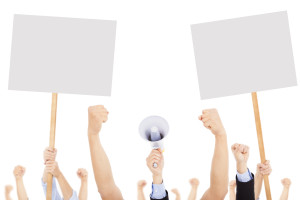
January 20, 2015
By S. Shane Sagheb
The recent tragedy in Paris and its aftershocks have prompted much in the way of action and commentary. The initial reaction of most Americans and Europeans to the terror attacks was appropriate condemnation of the violence. A march in Paris followed in support of those who had fallen and ostensibly also in support of free speech in general. The latter begs the question, “What are the appropriate bounds of ‘free speech’ in the 21st century?”
Free speech is not now, nor has it ever been, absolute. There are certain prohibitions and/or consequences associated with certain speech, even in Western societies. You cannot, without consequences, yell “fire” in a crowded theater, joke about having a bomb when in an airport security line, or defame another. “Free” speech has an element of responsibility associated with it – if you are not responsible in your exercise of free speech, you may be held responsible for the consequences.
This element of responsibility seems to have eluded the discussion regarding the Paris tragedy, until recently. It was reported last week that Henri Roussel, the co-founder of Charlie Hebdo, criticized slain editor Stephane Charbonnier for “overdoing it,” referring to the publication’s cartoons depicting Mohammed.
Did Charlie Hebdo overdo it? It’s an issue that should not be ignored. I’m not suggesting that the violent attacks in any way could be justified. These were acts of barbarism that had no sound basis in reason. But was that consequence reasonably foreseeable? If so, was it responsible to have published the cartoon? Mr. Roussel may have a point.
It is widely known that many Muslims find offensive any depiction of their prophet Mohammad. Charlie Hebdo has not claimed lack of such knowledge. Instead, the new editor of the publication, Gerard Biard, recently defended his publication’s cartoons depicting Mohammed as a defense not only of freedom of speech, but also of freedom of religion. I doubt that Muslims see it that way.
Understandably, non-Muslims and those of us who live in “free” societies do not agree that the depiction of Mohammed is blasphemous. We do not understand why some Muslims are offended by these depictions. That lack of understanding, however, should not mean that we may feel free to ignore or mock the religious views of Muslims. This simply is disrespectful.
Some people can retain a sense of humor in the face of disrespect. Don Rickles made a career disrespecting others, and in light of the longevity of his career, his audiences have enjoyed the act. However, there does not seem to be any room for humor in at least some areas of the Muslim world when it comes to visual depictions of their prophet. In the view of these Muslims, most of whom do not promote or condone terrorism, such depictions are slaps in their faces.
Is disrespectful speech an exercise of free speech in Western societies? Of course. But should we promote the exercise of such disrespectful speech when we know that it is hurtful? This is where responsibility enters the discussion.
Perhaps to inject responsibility into the equation, the French government has prohibited “hate” speech. Unfortunately, enforcement of these laws causes more problems than it solves. An allegedly anti-Semitic Muslim comedian was recently arrested in France for having posted the following comment on Facebook after the Paris attack: “Tonight, as far as I’m concerned, I feel like Charlie Coulibaly,” referencing both the Charlie Hebdo publication and the name of one of the attackers. Anti-Semitism is abhorrent, and if there is humor in this post, I don’t see it. That’s not the point, though. The point is that the arrest of the comedian for this post, which on its face is non-threatening, constitutes censorship and thus is the exact opposite of free speech. As David Carr wrote in the January 14, 2015 edition of the New York Times, “His arrest highlights the fact that one man’s free expression is another man’s hate speech or sedition.”
Putting the shoe on the other foot, one may argue that the Charlie Hebdo cartoons depicting Mohammed constitute “hate” speech directed at Muslims. Yet, no arrests have been made of any of the publication’s personnel. (Of course, they have paid a far more tragic price for their speech.)
This selective enforcement of “hate” speech laws results in nothing short of hypocrisy. More than a million people marched in Paris in support of free speech. Speech is not free, however, when individuals of a certain religion or belief system are arrested for expressing words deemed unacceptable by others. Such arrests are the antithesis of free speech. For speech to be truly free, the expression of views cannot be suppressed simply because there is disagreement. The right to express disagreement is the very embodiment of free speech. Yes, we must remain committed to that ideal. At the same time, however, we should be mindful of the personal responsibility that comes with this freedom.

 5950 Canoga Avenue, Suite 130
5950 Canoga Avenue, Suite 130